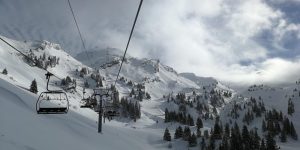TRAVEL BLOG 28/01/2019
With so much snow falling recently, Austria seems to be the ideal half term destination for a family ski adventure. But there are a few more alternatives that might be worth exploring to make your money go that little bit further.
Main European resorts
With the exchange rate for the pound wavering around £1/1.13 euro at the moment, taking a family ski trip for half-term could be more the expensive it has been for years, despite the good snow.
Currently topping the snow depth chart for Europe with up to 600cm on the highest slopes, St Anton is an attractive destination. But at £155 (€ 172.00) for a child and £260 (€ 289.00) for an adult, the current exchange rate is playing havoc with the cost of a weekly ski pass. Making Austria surprisingly more expensive than Switzerland this year.
With similar snow depths of 600cm, Andermatt’s week-long passes start at £118 for children (CHF 144) and £230 (CHF287) for adults, making this popular resort unusually cheaper for UK skiers. Even Engleberg (490cm), with its Victoriana hotels and high glacial views, offers an affordable swiss alternative with lift passes at £98 for a child and £238 Adult.
Even France is struggling to compete with the unfavourable exchange rates. The family favourite resort of La Rosiere, high on the Italian/French border, boasts one of the deepest snow depths (250cm) in France at the moment. Unfortunately, the in-resort ski passes aren’t quite as attractive and will leave a hefty dent in your ski budget of £720 (€760) for a family of four.
Eastern Europe
While not as big as some middle European resorts, those in the eastern provinces have always offered great value for money. With a more attractive exchange rate than the euro, families should give them some serious consideration, especially with the new snow levels forecast in the next two weeks.
Wisła – Cieńków in Poland, doesn’t offer the deepest snow conditions at just 120cm on the slopes, but it does offer the very appealing price tag of £89 (PLN 400.00) for a 6-day adult pass. Romania’s popular resort of Poiana Brașov is currently only measuring 90cm on the top slopes but boasts similar tantalising pass prices from £57 – £106 (RON 275- 530.000).
If the pre-half-term weather patterns are correct and the snow levels receive the expected boost into double figures, Jahorina (Bosnia and Herzegovina), Popova Sapka (Macedonia) and Bansko in (Bulgaria) are very attractive options for a family ski adventure in February. Lift pass prices start from just £132 (MRK 228), £200 (DENAR 14,200) and £540 (BGN 1070) for a family of four.
Northern Europe
With middle Europe receiving most of the big snow so far this winter, Sweden and Norway are trailing behind with snow depths of 60-100cm. However, Sälen does offer a great range of skiing for its reasonably low £138 (SEK 1530) adult pass. As does Trysil, Norway’s largest and most family centred resorts, where skiing times extend in February, so families can make good use of the collective family pass price of £768 (NOK 7650).
Other continents
In the US, Soda Springs (CA) tops the snow depth so far this season at 462cm, but like Mount Baker (365cm ), it is one of the smaller American resorts. Family-friendly Mammoth, also in California, has a larger ski area and a current level of 330cm on the top pistes. A tempting destination for UK skiers if it wasn’t for the pass prices. At almost double that of the European equivalent resorts, it doesn’t offer good value for money £1,220 ($1554) thanks to the low exchange rate of £1/$1.29.
For the best ski pass deals and snow depths over the Atlantic and Pacific, take a look at Japan and Canada. At an exchange rate of £1/ $ 1.69, Tremblant ski passes £160 (CA$264) for a child and £285 (CA$474) to access the 320cm snow depths at the top of the mountain are reasonable.
If you are willing to trade lower snow depths for better pass prices, Japan’s renowned family resort of Kiroro can provide access to 290cm of snow for just £120 ( ¥16,100) for a child and £216 ( ¥30,900) for an adult.

Comments are closed.